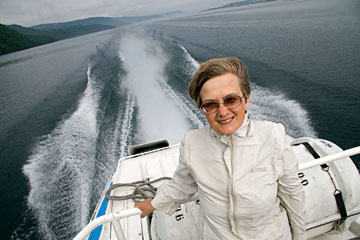
Four hundred miles (640 km) long and up to a mile (1.6 km) deep, Siberia's Lake Baikal is the world's largest body of fresh water. It contains over 1,500 unique animal and plant species and 20% of the planet's unfrozen freshwater reserves. In the 1960s, the huge Baikalsk Pulp and Paper mill was set up beside the lake to help kick-start Siberia's impoverished economy. The mill, which allegedly discharges chemicals that harm the lake's ecosystem, would become the catalyst for the Soviet Union's first major environmental movement — a grassroots effort to close it down. Today, the mill is still operating, and the fight to protect Baikal from threats old and new continues, thanks largely to Marina Rikhvanova.
A scientist by education, Rikhvanova, 47, has been exploring Baikal since she was a child in the Siberian city of Irkutsk, where her father made films about the lake. In 1990, she co-founded the Baikal Environmental Wave (BEW), an NGO focused on protecting the lake from the side effects of development. In 2006, after BEW had spent four years staging protests and gathering signatures, Russia's then President Vladimir Putin publicly ordered the boss of state-owned Transneft to reroute an oil pipeline planned to skirt the lake. It was proof, says Rikhvanova, "that people can change the decisions of government."
There's no shortage of other problems to address: the toll of zinc and lead mining, agricultural runoff and air pollution. Still battling to close the mill, BEW has also started monitoring the impact of the lake's fast-growing tourist industry, and it's leading the charge to halt development of a uranium-enrichment center at a nuclear-fuel plant in nearby Angarsk, which would leave the region with the additional burden of radioactive waste.
Rikhvanova says Russian state authorities have harassed BEW, seizing computers and assets, and claims that the arrest of her son — who is awaiting trial on charges relating to a 2007 attack by nationalists on a protest camp in which one person died — is an attempt to discredit her campaign. "Sometimes I think Moscow doesn't hear us," says Rikhvanova. Which just means she'll have to shout a little louder.